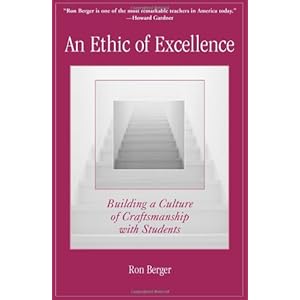On the last few days of our recent trip to Germany, we spent some time in the beautiful countryside of Batten-Wurtemburg and I carried around Ron Berger's An Ethic of Excellence to enjoy in bits and pieces during our explorations. An Ethic of Excellence is about as close to required reading as I'm gonna get this summer: I joined a Big Ideas committee at school and my principal bought us each a copy of this book to read over the holidays.
Normally when I read books for professional development, I have to be pretty intentional about pausing to reflect. I pull out a notebook or a pack of sticky-notes as a reminder to slow down and think critically about what I'm reading. However, when you're hiking through the peace and quiet of a park in the Black Forest on a Monday afternoon, there's nothing forced about it. The internal dialogue just sort of...begins.
An Ethic of Excellence was on my mind as we pulled into the parking lot at the base of Wasserfälle Allerheiligen (All Saints Waterfalls). Perhaps I was looking for something to distract myself from the oodles of staircases ahead. Most likely it was a combination of that and the fact that, despite its slim size and conversational tone, An Ethic of Excellence is dense with intensity and inspiration--more tightly packed than my carry-on luggage.
 |
| Wasserfälle Allerheiligen: Stairs, stairs, and more stairs. |
Berger's book is a manifesto: he urges educators to make some significant changes in how they approach, value, and think about learning tasks and assessment in the classroom. He writes passionately about the advantages of taking an integrative, project-based approach to learning. He calls for a shift in school culture and a transformation of teacher and student roles. As I started the climb, I started to think about change in my profession and to consider our choices in how we respond to it.
We do have choices when it comes to responding to change. I found them quite analogous to the choices I got to make that day.
1. We can choose to ignore change and let others do the exploring. We can choose to wait at the point of departure, while others embark on the journey and wait for them to bring us news of their discoveries.
2. We can choose to forge ahead blindly. We can put our heads down and thoughtlessly follow the trail laid out for us, putting one foot in front of the other without looking up until we reach the destination. Granted, choosing this approach means there's no time for rest, no time to pause and check the map. We might reach the top, but we might be so tired when we get there that we'll miss the point of the journey.
3. We can head off the trail, impulsively blazing a path that is completely our own. Don't get me wrong, there is a time and a place for trailblazing, but there's a certain amount of wilderness know-how required before this is truly a wise move. Most likely, if we move in this way, there's a good chance we might get lost, confused, discouraged and there's also a pretty good chance we're going solo--no one is going with us, and no one is going to follow.
4. We can choose to savour the journey, pausing to rest, reflect, and take in the scenery as we pass by We can linger and notice the details, take photographs to preserve memories of our favourite parts, check in with the map to determine our progress, listen to the sounds around us, take it all in.
We can take time to leave trail markers for those who will take this climb after us, small signs of encouragement along the way.
This was not a climb up Everest. This was just a significantly steep climb, straight up, on a hot July afternoon. Every opportunity for change is not a drastic one. "A journey of a thousand miles begins with a single step," but so does a journey of one mile.
How will you choose to travel?




No comments:
Post a Comment